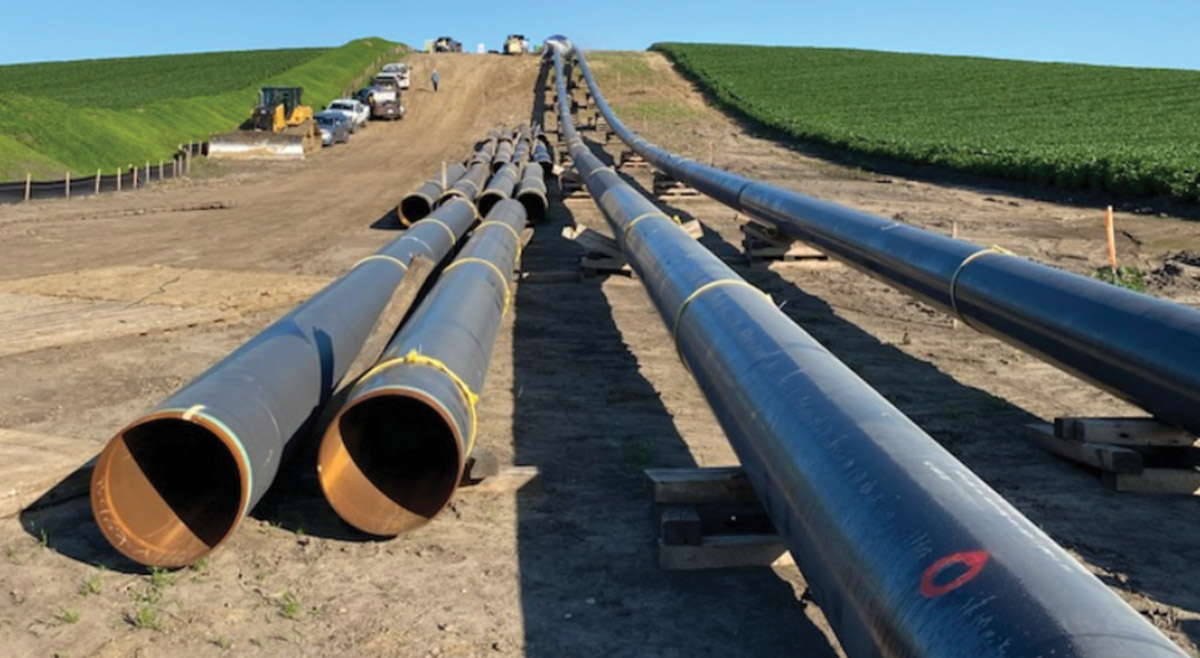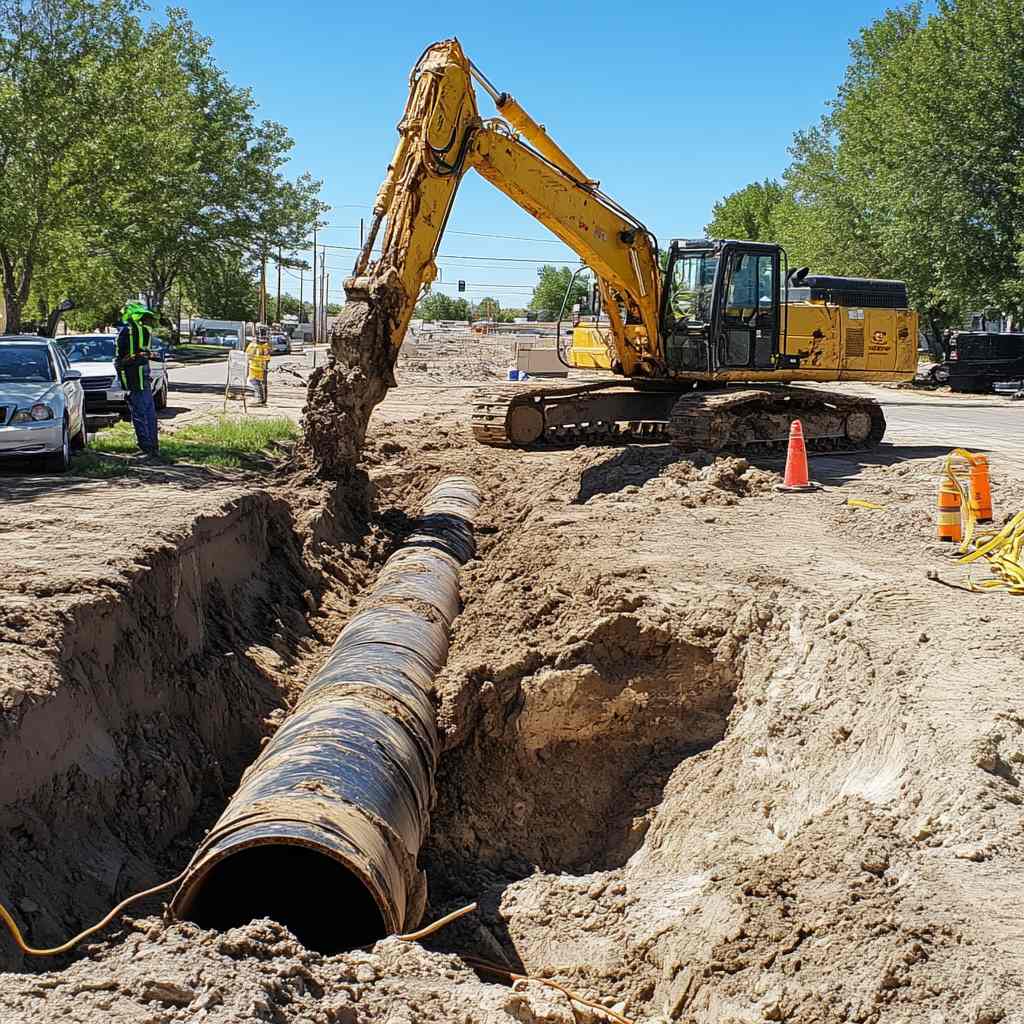How to Evaluate Experience and Expertise in Pipeline Construction Services
Wiki Article
The Necessary Overview to Recognizing Pipeline Construction Providers and Their Relevance
Pipeline Construction solutions are essential to the transportation of vital resources such as gas, water, and oil. These services include meticulous planning and execution, adhering to stringent safety and ecological standards. As the sector adapts to modern-day difficulties, comprehending its implications and components comes to be progressively essential. What factors contribute to the expanding value of these solutions in today's economic climate? The complying with sections will discover these crucial facets.Summary of Pipeline Construction Services
Pipeline Construction solutions incorporate a variety of activities essential for the installment and maintenance of pipes used to transfer numerous compounds, consisting of water, oil, and gas. These services are crucial for assuring the effective and secure motion of resources from one area to another. The procedure normally begins with thorough preparation and design, which takes right into account regulatory needs, ecological considerations, and logistical obstacles.Excavation and grading of the land are conducted to prepare the site for Pipeline installment as soon as planning is total. This is adhered to by the actual laying of the pipes, which involves welding or signing up with areas together to produce a continual flow course. After setup, strenuous testing is carried out to ensure stability and safety and security. Maintenance services are likewise given to address any concerns that might arise in time. On the whole, Pipeline Construction solutions play a critical function in sustaining framework for power and water circulation.
Secret Elements of Pipeline Construction
An effective Pipeline Construction project relies on a number of crucial elements that guarantee the efficient and risk-free installation of the Pipeline system. Thorough site analyses are vital, as they determine the environmental and geographical aspects that may influence Construction. Next off, the selection of ideal materials, such as pipes and installations, is crucial for securing sturdiness and compatibility with the delivered materials.Progressed Construction techniques, consisting of trenchless innovation and directional drilling, boost performance and minimize ecological effect. Effective task administration is another essential part, collaborating labor, equipment, and timelines to fulfill job goals.
Furthermore, communication amongst stakeholders, including designers, specialists, and neighborhood authorities, warranties positioning on task specs and requirements. Comprehensive high quality control procedures throughout the Construction process make sure compliance with market criteria and take full advantage of the Pipeline's operational life-span. Collectively, these elements create the backbone of an effective Pipeline Construction job.
Safety And Security Criteria and Rules in Pipeline Construction

Governing bodies, such as the Occupational Safety and Health And Wellness Management (OSHA) and the Pipeline and Hazardous Materials Safety Administration (PHMSA), stated certain needs that govern Construction methods. These include procedures for devices usage, employee training, and emergency situation action treatments. By implementing these requirements, Construction business not only protect their workers however likewise safe public depend on. Eventually, extensive safety and security procedures add to the long-lasting success of Pipeline jobs, ensuring they satisfy both environmental and operational expectations.
Environmental Factors To Consider in Pipeline Projects

Ecological factors to consider are essential to the planning and implementation of Pipeline projects. These projects have to examine prospective impacts on ecosystems, water sources, and regional wild animals. Carrying out complete environmental influence evaluations (EIAs) is important, allowing stakeholders to determine and reduce threats before Construction starts.
Shielding sensitive locations, such as wetlands and environments, frequently requires carrying out particular layout features or different routing to decrease interruption. In addition, Pipeline operators are entrusted with developing methods for stopping leaks and spills, which can have devastating impacts on the setting.
Engagement with local neighborhoods is crucial, as public issues can bring about project adjustments that improve environmental security. Conformity with regulations set by ecological companies assures that projects satisfy sustainability criteria, fostering a balance in between framework demands and eco-friendly preservation. Eventually, resolving environmental factors to consider not just safeguards nature yet also promotes area count on and task practicality.
The Duty of Technology in Pipeline Construction
Innovation plays an important function in contemporary Pipeline Construction, improving performance and precision. Advanced evaluating strategies permit accurate planning and execution, lessening ecological impact and project delays. Additionally, the integration of automation and robotics improves operations, decreasing labor expenses and enhancing security on Construction sites.Advanced Surveying Techniques
Advanced evaluating strategies play an important role in the effective execution of Pipeline Construction tasks. These approaches take advantage of advanced innovation to assure specific mapping and evaluation of the terrain where pipes will be mounted. Techniques such as Geographic Info Solution (GIS), LiDAR (Light Discovery and Ranging), and 3D modeling allow engineers to analyze the landscape and imagine, recognizing ecological concerns and prospective obstacles. By utilizing these innovative tools, groups can enhance accuracy ready and positioning, considerably reducing the danger of errors during Construction. In addition, real-time data collection permits instant modifications and educated decision-making throughout the task lifecycle. Ultimately, these checking technologies add to enhanced effectiveness, safety and security, and sustainability in Pipeline Construction efforts.Automation and Robotics

Economic Effect of Pipeline Framework
Pipeline framework plays an important role in promoting and forming regional economic climates trade. By providing a dependable methods of delivering oil, gas, and other commodities, pipes reduce transport expenses and enhance supply chain performance. This infrastructure attracts financial investment, promotes job production, and cultivates economic development in surrounding locations.The Construction and maintenance of pipes contribute significantly to neighborhood economic situations, creating many employment possibilities in various industries, from design to labor. The influx of tasks typically causes increased costs in neighborhood companies, better bolstering economic task.
Additionally, pipelines boost power security by making sure a stable supply of resources, which is important for property demands and commercial procedures. As regions become interconnected via Pipeline networks, they get to broader markets, enhancing competition and economic more info here durability. As a result, the financial effect of Pipeline framework is multifaceted, influencing both immediate local economic climates and wider regional advancement.
Future Fads in Pipeline Construction Providers
The future of Pipeline Construction solutions is evolving in response to technical innovations, governing adjustments, and expanding ecological factors to consider. Developments such as drones and robotics are improving inspection and maintenance procedures, improving safety and efficiency. Automation is positioned to decrease labor costs and increase precision in Construction operations. Furthermore, the enhancing emphasis on sustainability is motivating firms to embrace eco-friendly products and practices, straightening with worldwide efforts to reduce carbon footprints.Regulatory structures are also adjusting to deal with ecological effects, promoting better transparency and liability in Pipeline jobs. Additionally, the integration of clever modern technologies, including real-time monitoring systems, is expected to improve the integrity and performance of Pipeline networks. As energy demands change toward eco-friendly sources, Pipeline Construction services will likely see a surge in projects connected to biofuels you could try here and hydrogen transportation. In general, these patterns show a transformative period for the Pipeline Construction industry, focused on technology and sustainability.
Frequently Asked Concerns
What Sorts of Pipelines Are Commonly Constructed?
Different sorts of pipes are typically built, consisting of oil, water, sewer, and gas pipelines - Pipeline Construction Services. Each serves distinct purposes, promoting the transportation of vital resources across areas while adhering to security and environmental guidelinesFor how long Does a Normal Pipeline Task Take?
The period of a regular Pipeline task differs substantially, usually varying from numerous months to a couple of years. Variables affecting this timeline consist of job intricacy, regulative approvals, and environmental factors to consider that must be addressed.Who Controls Pipeline Construction Firms?
Pipeline Construction business are controlled by various government, state, and neighborhood companies, including the Pipeline and Hazardous Products Safety And Security Management (PHMSA) and state utility commissions, ensuring conformity with security and environmental criteria throughout the Construction procedure.What Are Typical Products Used in Pipeline Construction?
Usual products used in Pipeline Construction consist of pvc, polyethylene, and steel. Each product supplies unique benefits such as sturdiness, resistance, and adaptability to deterioration, making them appropriate for numerous applications in carrying gases and fluids.
How Are Pipeline Construction Costs Approximated?
Pipeline Construction costs are approximated by examining elements such as material costs, labor rates, task intricacy, ecological considerations, and regulatory needs (Pipeline Construction Services). Accurate price evaluation guarantees reliable budgeting and task planning throughout the Construction procedurePipeline Construction services include an array of tasks necessary for the installation and upkeep of pipelines utilized to transfer numerous compounds, consisting of oil, water, and gas. An effective Pipeline Construction project depends on several crucial components that ensure the reliable and safe installation of the Pipeline system. Advanced checking strategies play an essential role in the successful implementation of Pipeline Construction tasks. Various types of pipelines are generally created, including oil, gas, water, and sewer pipelines. click here to read Pipeline Construction expenses are approximated by assessing factors such as material costs, labor prices, job complexity, environmental considerations, and regulative demands.
Report this wiki page